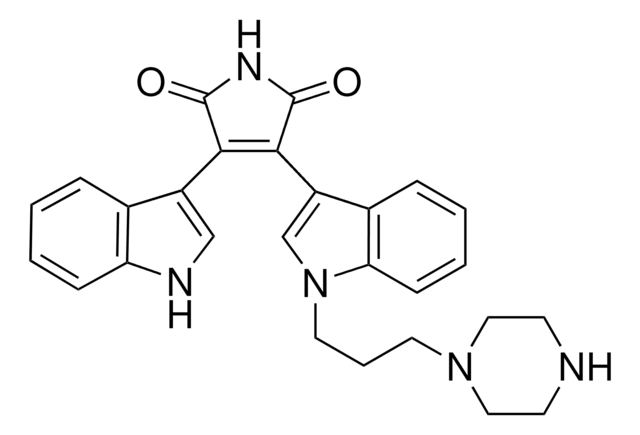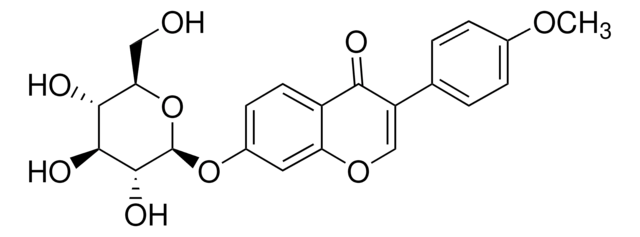B3931
Bisindolylmaleimide X hydrochloride
≥90%, solid
Synonym(s):
Ro 31-8425
About This Item
Recommended Products
biological source
synthetic (organic)
Quality Level
Assay
≥90%
form
solid
solubility
DMSO: soluble
storage temp.
−20°C
SMILES string
Cl.Cn1cc(C2=C(C(=O)NC2=O)c3c4CC(CN)CCn4c5ccccc35)c6ccccc16
InChI
1S/C26H24N4O2.ClH/c1-29-14-18(16-6-2-4-8-19(16)29)23-24(26(32)28-25(23)31)22-17-7-3-5-9-20(17)30-11-10-15(13-27)12-21(22)30;/h2-9,14-15H,10-13,27H2,1H3,(H,28,31,32);1H
InChI key
IMBOYWXMTUUYGZ-UHFFFAOYSA-N
Application
- in chemotaxis assays
- to inhibit protein kinase C and to study its effects on the expression of EGR1, NAB2, ZEBRA, and Rta
- in the culture to study its effects on the expression of the kinase-insert domain-containing receptor (KDR)-B1, protein kinase Cθ (PKCθ)-M1a or Abl-HTa and on cell yield in baculovirus (BV)-infected insect cells
Biochem/physiol Actions
Storage Class Code
11 - Combustible Solids
WGK
WGK 3
Flash Point(F)
Not applicable
Flash Point(C)
Not applicable
Personal Protective Equipment
Certificates of Analysis (COA)
Search for Certificates of Analysis (COA) by entering the products Lot/Batch Number. Lot and Batch Numbers can be found on a product’s label following the words ‘Lot’ or ‘Batch’.
Already Own This Product?
Find documentation for the products that you have recently purchased in the Document Library.
Our team of scientists has experience in all areas of research including Life Science, Material Science, Chemical Synthesis, Chromatography, Analytical and many others.
Contact Technical Service








